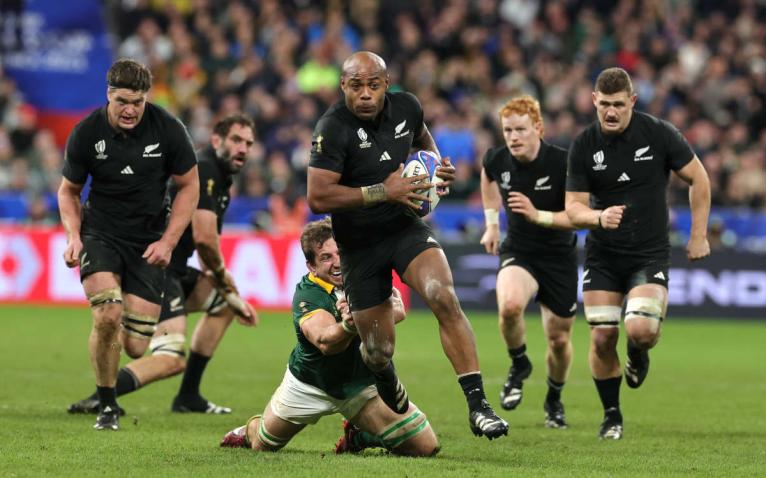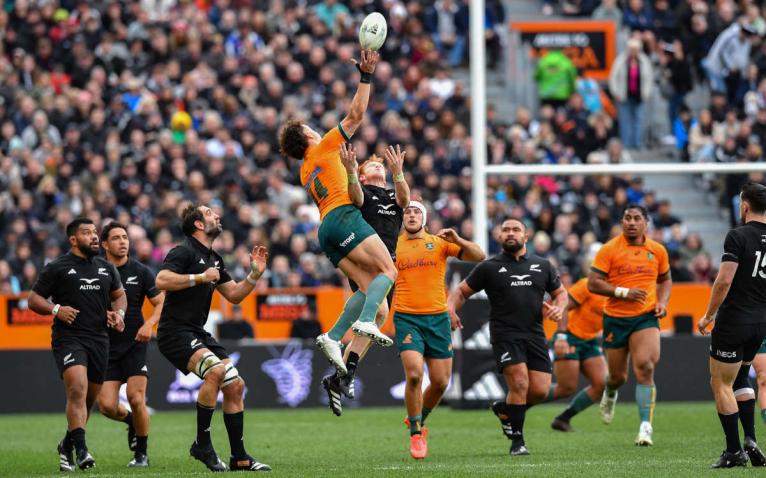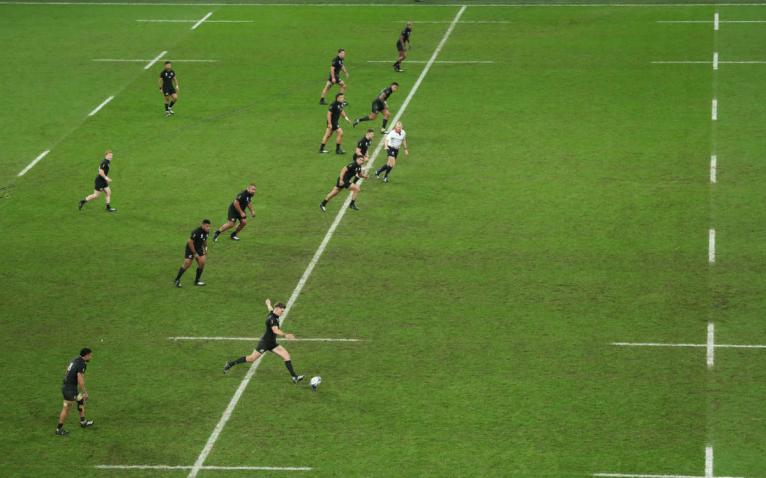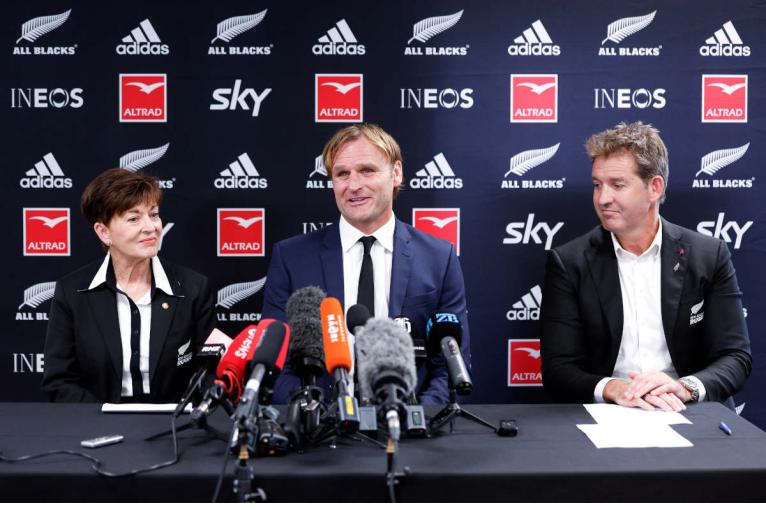In the days after the World Cup quarter-finals, global media were waxing lyrical about one of the greatest weekends of rugby ever produced.
There was genuine wonderment about how brilliantly the four games played out – showcasing the fundamentals of the sport and the quirks that set it apart.
The pace, intensity and skill level of the New Zealand versus Ireland and France versus South Africa games were incredible.
There was set-piece crunch, brilliant attack, brave defence, a desire to take risks and a breathlessness that took all four teams to the brink of their aerobic capacities.
The other two encounters didn’t have the same intensity or skill-level, but they were compelling in their own ways – and certainly no one who paid to watch England beat Fiji or Argentina beat Wales, would have felt they didn’t get value for money, or that they wouldn’t want to buy a semifinal ticket.
But here we are now, six weeks after the final in which South Africa sneaked past New Zealand 12-11 and the conversation in the Southern Hemisphere has switched to trying to determine ways in which to fix the game.

The mood in New Zealand changed in the weeks after the final, to one of concern that international rugby needs a re-set to help produce a consistently entertaining product.
Specifically, Kiwis believe there is a need to clear-up the role of the TMO and how they interact with the referee.
Executives, coaches, players and media have all had their say on this topic – unanimously agreeing that they would like to return to a world where the referee is unambiguously in charge, with light support from the TMO available on request.
NZR chief executive Mark Robinson is leading the charge, telling media in Auckland last week that: “We saw some incredible rugby at the tournament [RWC], and early on we saw, especially in southern France, some incredible scenes around fans being able to get close to teams. We saw some great footy, and some significant upsets.
“It’s fair to say as the tournament grew there was fan frustration around some elements of the game.
“We are very interested to be part of the ongoing discussion that’s going to take place in the near future to look to address that.
“We are very clear in New Zealand, and we believe in Australia, and we believe other parts of the world are starting to acknowledge that the fan has to be far more greatly considered in our consideration of what we’re going to do with the future state of the game.”
It’s understandable that there is some angst in New Zealand about the role technology plays in the game, after a World Cup final that was at times confusing in the way it was officiated.
And probably Robinson is right that most other countries are keen to get this area tidied up and to better establish the referee as the primary official.
But New Zealand’s concern about the state of international rugby runs a little deeper, and it’s apparent that they feel they want more done to facilitate a faster, aerobic contest.

The feeling in New Zealand is that the quarterfinal weekend was the exception rather than the rule, and that international rugby frequently disappoints fans by producing low-tempo contests that are punctuated with too many unnecessary stoppages.
The stats out of the World Cup certainly support New Zealand’s general sense of the game being less fluid and more kick driven.
According to data from Opta, the average number of phases per possession dropped to 1.8 in 2023, compared with three in 2019.
The numbers also showed that the average number of offloads per game was down to 13.8, which compares with 30 in 1987, 17 in 2011 and 15 in 2019, while 25 per cent of all kicks were classified as box kicks, compared with just five per cent in 1987.
These numbers suggest rugby is more conservative than it has ever been with teams preferring to play without the ball and kick high and short.
And, with several games extending past 100 minutes in total due to the length if time taken to review decisions, New Zealand’s mission to see if things can be changed seems valid.
However, what’s interesting to ponder is whether New Zealanders would be on this crusade had Jordie Barrett kicked a late penalty in the final to win it for the All Blacks.
If they had won the final, would they still think the TMO and referee had a confused relationship, and that fans were let down by the constant stoppages?
What’s also true is that New Zealand, and to some extent Australia, has its own, defined, singular take on what type of rugby it likes.
The prevailing view in Oceania is that international rugby should be high-tempo, ball-in-hand and focused more on attacking space, scoring tries and producing aerobic contests.
This year’s Bledisloe Cup test in Melbourne saw the ball-in-play for a staggering 44 minutes – staggering because the average at the World Cup was about 34 minutes.

That sort of open, running rugby suits the athletes both New Zealand and Australia seem to naturally produce and aligns with the style that is predominantly seen in Super Rugby where games can often produce 10-12 tries.
Robinson seems to think there is growing support among his Northern Hemisphere colleagues to put the game under scrutiny and ask hard questions about whether it is producing the sort of entertainment qualities that he says fans everywhere want.
“We will be looking at the challenge of making the game more fan-centric at the international level,” Robinson said.
“There will be key meetings at the end of February in Europe between ourselves, our Sanzaar partners, the Six Nations and World Rugby and right at the heart of the conversation is how we look to continue to make sure we’re more consistently seeing the kind of rugby we believe all fans want to see.
“A number of key strands go into that work. We’ve got to have the right information so we’re clear on what fans want to see. How does that then impact on our laws?
“How can we support our match officials, and our players and coaches, to make sure the product can be truly spectacular and special so more and more fans around the world want to gravitate towards it?”
But are the Australasians correct, that this is the style of rugby fans everywhere want to see and that due consideration should be given to looking at ways – be it through experimental law changes or other means – to adapt the current game to enhance the likelihood of more test matches having more running content?
Is fast and furious the only means by which to ensure fans around the world will be hooked on international rugby?
Despite Robinson’s confidence, it seems unlikely that South Africa and the Six Nations view the game through the same lens and that New Zealand will struggle to gain much traction with any hard pitch that that is seen to play into the All Blacks’ hands tactically.
Rugby, after all, is a game built on the premise that it is for all shapes and sizes and that makes scrums and lineouts a critical part as they remain the primary reason the sport needs 125kg props, 2.02m locks and 1.7m scrum-halves.

The North still build much of their tactical planning around the set-piece and its often the clash of styles that makes test rugby so compelling.
The final was a case in point – South Africa picking seven forwards on their bench, gambling they could physically crush a New Zealand team, with the risk that if they were wrong, the All Blacks could run them off their feet.
The week before in the semi-final, England kicked almost all their possession – a tactic that was widely condemned in New Zealand, with media describing the encounter as one of the worst games of the tournament.
But the English media had an entirely different take – seeing it as the best performance of the Steve Borthwick era and a tactical masterclass that came up just two minutes short of producing a remarkable victory.
This is the magic of rugby – it is physical chess with teams having to play to their strengths while protecting their weaknesses and ultimately, what New Zealand will have to accept, is that fans will equate entertaining rugby with winning rugby.
The Kiwis may be adamant that faster, more open rugby equals more entertaining, but the rest of the world isn’t so sure.



Frankly, when NZ win, however, the world is fine. When they don’t, it is not. If they want to speed up the game and run faster, by all means, go for it. Try and outsmart the opposition, who have recently been outsmarting you. The game has a lot of ways to play, find your way to win, then win. Until then, please stop moaning that the Springboks have beaten NZ twice in the finals, etc etc
Does NZ understand that they are in the minority. So world rugby should grow the game by listening to its smallest fan bases?
WR must abandon their mandate of protecting SA at all costs if the game is to remain watchable by genuine rugby fans. Simple as that.
Please no!…I’ve seen enough 7s and Rugby league to know we have a brilliant product!…slight changes perhaps but as your article states if AB won its unlikely dramatic changes would be demanded!
rugby is lost as a sport if the way the Bok play becomes the norm.
However, what’s interesting to ponder is whether New Zealanders would be on this crusade had Jordie Barrett kicked a late penalty in the final to win it for the All Blacks.
Yes we would. Most emphatically. Ive stopped watching after playing and following for 60 yrs. ….and my kids and grandies arent interested either. The game is excruciating to watch.
All nations use different EVLs to improve rugbies spectacle, so why aren’t some of these ELVs used to improve the philosophy of rugbies spectacle even more?
Won’t tweaking and adding some more experimental variation laws create a better spectacle with more ball in play, while creating more time for the precision of the TMO to make sure the right teams wins. Like reviewing some tries back five phrases for fouls. Otherwise any team could win a Super rugby game or the RWC by cheating and many people would stop watching it.
1/ The TMO ref alone must become the sole judge of maul or ruck tries, to help the field-ref avoid being called BIAS because they haven’t got an eagle-eye. All ruck or maul tries or any technicalities leading up to a try must be checked by the TMO within the last five phrases before rewarding a try or the game of rugby will become a joke, because that stops teams from cheating to win. Or lose some spectators!
Only a few tries need checking, which wastes very little time. You can see everything that the TMO sees on the big screen as common-sense anyway. Just as having “no” field-refs ‘soft or hard’ decision given, “could” influence the TMOs eagle-eye to become blind?
To use the TMO correctly only takes very little game TIME. To not use the technology correctly when it suits, is to make the wrong team win the game like sanctioned undetectable cheating. Why watch this game if the spectators don’t get the vital decisions judged correctly?
2/ To combine Australasia’s 20-minute red card with the RWCs TMO bunker system. Which would eliminate most pedantic penalty sanctions as technicalities while speeding the game up!
3/ Why is the field ref legally allowed to sanction any player with a CARD without a quick TMO review?
4/ Using the TMO as a timeclock would eliminate a lot of dead time making 20-minute quarters very necessary. Having 20-minute quarters helps rehydrate a team and can speed the game up, by only allowing subbing in every quarter (Subbing during game slows the game up). Why aren’t 10 subs allowed on the bench to avoid golden oldy scrums, while creating heaps of extra combinations and extra coaching to keep the game simple?
5/To make all attempted intercepts that aren’t intercepted to be at least a scrum advantage or when they stop a try from being scored to be an automatic yellow-card sanction.
6/ To allow only one scrum to stop penalties, then a free kick. All scrum infringements should be free-kicks. This will stop teams scrumming for penalties and matches won’t be decided by contentious penalties.
7/ To make all 50/50 calls within the oppositions twenty-two, to be given to the attacking team to help the field-ref avoid bias as he hasn’t got the TMOs eagle-eyes, that will obviously create more tries.
8/ To limit four consecutive penalties within the twenty to be a YELLOW CARDED sanction.
9/ For every twelve penalty in a game to be a team sanctioned penalty as a YELLOW CARD.
10/ To not allow any advantage to go passed 5 phases (use it or lose it), as a team could take a scrum.
11/ To only allow the golden-point rule as a tie-breaker to be used only in the playoffs where the first try is the winner of the game. (kicking goals should be irrelevant as the wind can do that by itself).
12/ If a player catches the ball on the full from any kick outside the twenty-two, they can call ‘mark’ tap and go. This will discourage teams from doing box kick after box kick and actually attack with the ball. The kicks they should use should be grubbers or chips to find grass. Then bounce of the ball could go either way.
13/ Players cannot ‘jackleg’ for the ball at rucks (e.g. can’t put their hands on the ball in a ruck). Players aren’t trying to win the ball, but rather win a penalty. To turn the ball over, they will need to counter ruck and take that space. This should lead to more clean turnovers, take the referee out of the game, plus make the breakdown safer.
14/ To only have a losing ‘bonus point’ for a loss of five points and under and to ditch the four try ‘bonus point’ as a team’s ‘for and against’ shows that stat anyway?
I’m inclined to let Northen & Southern styles exist the sa me as is,! However I believe both sides agree that tha TMO needs putting back in the box & only adjudicating on a specific request from the Ref. This trawling back thru multiple phases for something that the Ref & his 2 sideline pimps have not seen has to be killed off. Let’s have 1 year of that before altering the game dramatically.
I like it like it is. Thanks.